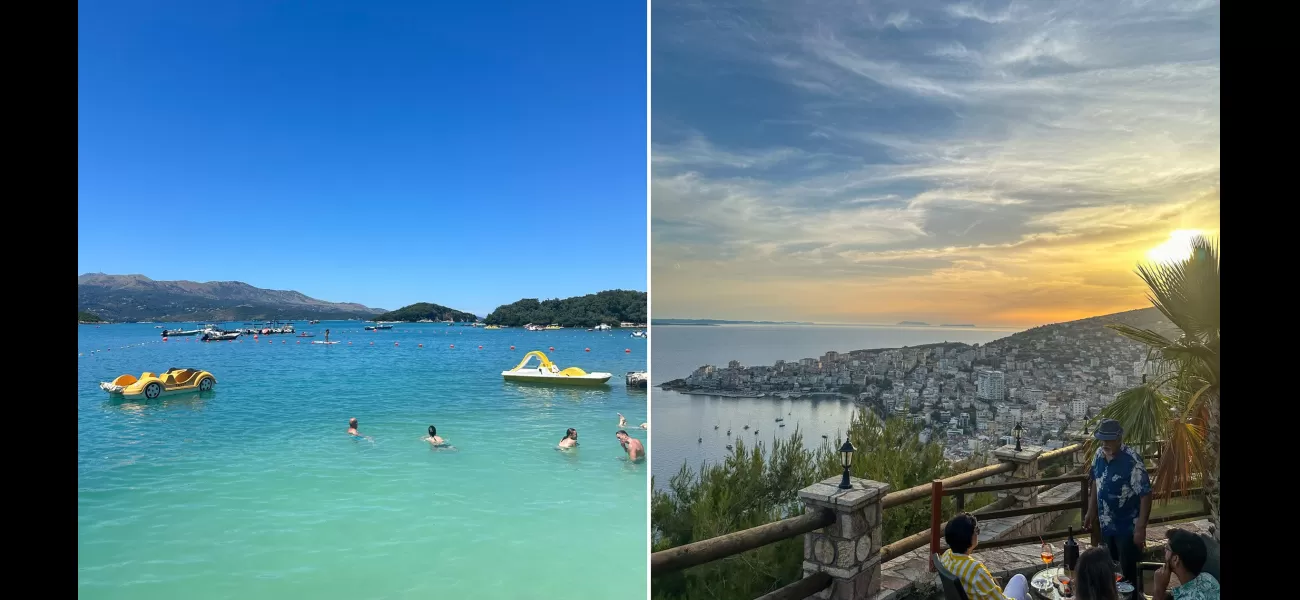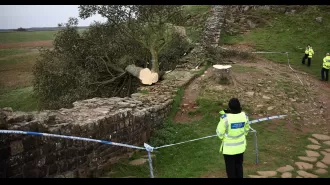I enjoyed the 'Maldives of Europe' but there is a looming threat.
August 8th 2024.

Tourism has exploded in this tiny European country in a way few expected. The once isolated nation, which was closed off from the rest of the world only three decades ago, is now experiencing an unprecedented surge in popularity.
As we speed down the freeway along the winding Albanian coastline, it's hard to believe that this was once a secluded country. Benny, our driver, is fiddling with Google Maps on the smart screen while Taylor Swift blasts through the speakers of our hybrid Volkswagen. We pass by lush hills, overshadowed by shiny shopping malls, speedboat vendors, and half-built apartment blocks on our five-hour drive to Sarandë, a resort town known as the 'Maldives of Europe' thanks to viral TikTok videos.
But as we approach this Instagram-famous paradise, the buildings become more frequent and towering, creating a concrete jungle that covers the entire coast of Sarandë's horseshoe-shaped bay. The view that initially greeted us upon arrival, with its sparkling blue ocean, is reminiscent of the Maldives, a place I recently visited. However, it's hard to fully appreciate this natural beauty when it's overshadowed by the looming concrete structures.
With this sudden surge in popularity, Albania and its visitors face a double-edged sword. As Nausheen Farishta, founder of travel company Globe Gazers, explains, the tourism boom brings much-needed opportunities to local communities, but it also brings challenges that cannot be ignored. According to UN Tourism data, Albania welcomed 7.5 million international arrivals in 2022 and 10.1 million in 2023, with the numbers continuing to rise. The local news website Kosova Press even ran a story with the headline "Albania is invaded by foreign tourists," reporting that Prime Minister Edi Rama announced a 34% increase in foreign visitors in the first six months of 2024 compared to the previous year.
There are even online discussions, such as a Reddit thread titled "The consequences of mass tourism in Albania," dedicated to the issue. The thread is filled with posts from travelers who have witnessed the effects of overcrowding, overbuilding, and the resulting damage during their visits to Albania.
It's an extraordinary turnaround for a country that was once isolated and only opened its doors to foreign visitors in 1991 after four decades of dictatorship. However, as my two friends and I experienced during our visit in June, the overcrowding and overbuilding are clearly visible. We were drawn to Albania by its rich history, turquoise waves, and white sand beaches, all of which we saw in viral videos. But while the price may be tempting (beachfront apartments can be rented for less than £20 a night, and a full meal with drinks can cost little more than £15), the reality is that the country has become chronically overbuilt.
Don't get me wrong, there are plenty of attractions in Albania. We enjoyed exploring the museums and trendy bars in Tirana, and the sunny weather and warm hospitality made our stay on the Riviera quite pleasant. However, it's hard to ignore the fact that the once-pristine beaches are now overshadowed by towering apartment blocks, making it less than ideal to lounge on a thin strip of sand at the bottom of a hill. The view from Poda Beach in Ksamil may be spectacular, but photos and TikTok videos only show one side of the story.
In conclusion, while Albania may offer an affordable paradise, it's important to acknowledge the consequences of mass tourism and how it may affect the country's natural beauty. As travelers, we must be mindful of our impact and consider ways to protect these destinations from over-tourism.
The influx of tourists into this small European country has been astonishing, catching many off guard. As we speed down the freeway from Tirana, following the meandering Albanian coastline, it's hard to imagine that just thirty years ago, this country was completely cut off from the rest of the world.
Our driver, Arban, prefers to go by the name Benny. He's busy navigating through Google Maps on the fancy smart screen, while Taylor Swift's latest hit blasts from the speakers of our hybrid Volkswagen. We zoom past lush hills, almost obscured by glitzy shopping centers, speedboat dealers, and half-finished apartment complexes, on our five-hour journey to Sarandë - a popular resort town on the Albanian Riviera, now dubbed the "Maldives of Europe" by TikTok users.
But as we draw closer to this Instagram-famous slice of paradise, the buildings seem to multiply at an alarming rate, forming a sprawling mass of multi-story hotels that cover the entire coast of Sarandë's horseshoe-shaped bay. The view that first greeted us upon our arrival in Sarandë, with its glistening blue waters, is reminiscent of my recent trip to the Maldives.
However, the sudden surge in tourism has led to a frenzy of construction, threatening to overshadow the natural beauty of this small Balkan country. It's difficult to fully appreciate a stunning view when it's overshadowed by a concrete jungle. So what are the implications of this drastic increase in popularity for Albania and its visitors? How can we protect its natural beauty from the negative consequences of over-tourism?
According to travel expert Nausheen Farishta, Albania's tourism boom is a double-edged sword. On one hand, it's bringing much-needed opportunities to the local communities, but we cannot ignore the challenges that come with rapid growth. In 2022, Albania welcomed 7.5 million international visitors, and that number increased to 10.1 million in 2023, according to UN Tourism data. And the trend is only expected to continue.
In fact, just last month, a local news website ran a headline exclaiming "Albania is invaded by foreign tourists," reporting that Prime Minister Edi Rama announced a 34% increase in foreign visitors in the first six months of 2024 compared to the previous year. There's even a Reddit thread dedicated to discussing the consequences of mass tourism in Albania.
I couldn't help but reflect on my recent trip to Ksamil, a small village on the Albanian Riviera, which has been growing in popularity over the years for good reason - its stunning beaches, delicious cuisine, and affordable prices. We were able to enjoy pints of beer for just £1.50, indulge in mouth-watering seafood for less than £10, and our two-bedroom apartment with a sea view cost us less than £35 per night. It's no wonder that more and more people are flocking to this hidden gem.
But this surge in popularity has also led to the overcrowding, overbuilding, and consequential damage to the environment. During my trip, I couldn't help but notice the excessive development and construction that has taken over the once-pristine coastline. Although it was exciting to explore the museums and trendy bars in Tirana, and relaxing to lounge on the cabana beds along the Riviera, I couldn't help but feel a sense of unease as I lay on a narrow strip of sand, surrounded by towering apartment buildings.
It's clear that Albania has plenty to offer, and its affordability is certainly a major draw for tourists. But it's crucial to address the issue of over-tourism and find a balance between promoting tourism and preserving the natural beauty of this extraordinary country.
As we speed down the freeway along the winding Albanian coastline, it's hard to believe that this was once a secluded country. Benny, our driver, is fiddling with Google Maps on the smart screen while Taylor Swift blasts through the speakers of our hybrid Volkswagen. We pass by lush hills, overshadowed by shiny shopping malls, speedboat vendors, and half-built apartment blocks on our five-hour drive to Sarandë, a resort town known as the 'Maldives of Europe' thanks to viral TikTok videos.
But as we approach this Instagram-famous paradise, the buildings become more frequent and towering, creating a concrete jungle that covers the entire coast of Sarandë's horseshoe-shaped bay. The view that initially greeted us upon arrival, with its sparkling blue ocean, is reminiscent of the Maldives, a place I recently visited. However, it's hard to fully appreciate this natural beauty when it's overshadowed by the looming concrete structures.
With this sudden surge in popularity, Albania and its visitors face a double-edged sword. As Nausheen Farishta, founder of travel company Globe Gazers, explains, the tourism boom brings much-needed opportunities to local communities, but it also brings challenges that cannot be ignored. According to UN Tourism data, Albania welcomed 7.5 million international arrivals in 2022 and 10.1 million in 2023, with the numbers continuing to rise. The local news website Kosova Press even ran a story with the headline "Albania is invaded by foreign tourists," reporting that Prime Minister Edi Rama announced a 34% increase in foreign visitors in the first six months of 2024 compared to the previous year.
There are even online discussions, such as a Reddit thread titled "The consequences of mass tourism in Albania," dedicated to the issue. The thread is filled with posts from travelers who have witnessed the effects of overcrowding, overbuilding, and the resulting damage during their visits to Albania.
It's an extraordinary turnaround for a country that was once isolated and only opened its doors to foreign visitors in 1991 after four decades of dictatorship. However, as my two friends and I experienced during our visit in June, the overcrowding and overbuilding are clearly visible. We were drawn to Albania by its rich history, turquoise waves, and white sand beaches, all of which we saw in viral videos. But while the price may be tempting (beachfront apartments can be rented for less than £20 a night, and a full meal with drinks can cost little more than £15), the reality is that the country has become chronically overbuilt.
Don't get me wrong, there are plenty of attractions in Albania. We enjoyed exploring the museums and trendy bars in Tirana, and the sunny weather and warm hospitality made our stay on the Riviera quite pleasant. However, it's hard to ignore the fact that the once-pristine beaches are now overshadowed by towering apartment blocks, making it less than ideal to lounge on a thin strip of sand at the bottom of a hill. The view from Poda Beach in Ksamil may be spectacular, but photos and TikTok videos only show one side of the story.
In conclusion, while Albania may offer an affordable paradise, it's important to acknowledge the consequences of mass tourism and how it may affect the country's natural beauty. As travelers, we must be mindful of our impact and consider ways to protect these destinations from over-tourism.
The influx of tourists into this small European country has been astonishing, catching many off guard. As we speed down the freeway from Tirana, following the meandering Albanian coastline, it's hard to imagine that just thirty years ago, this country was completely cut off from the rest of the world.
Our driver, Arban, prefers to go by the name Benny. He's busy navigating through Google Maps on the fancy smart screen, while Taylor Swift's latest hit blasts from the speakers of our hybrid Volkswagen. We zoom past lush hills, almost obscured by glitzy shopping centers, speedboat dealers, and half-finished apartment complexes, on our five-hour journey to Sarandë - a popular resort town on the Albanian Riviera, now dubbed the "Maldives of Europe" by TikTok users.
But as we draw closer to this Instagram-famous slice of paradise, the buildings seem to multiply at an alarming rate, forming a sprawling mass of multi-story hotels that cover the entire coast of Sarandë's horseshoe-shaped bay. The view that first greeted us upon our arrival in Sarandë, with its glistening blue waters, is reminiscent of my recent trip to the Maldives.
However, the sudden surge in tourism has led to a frenzy of construction, threatening to overshadow the natural beauty of this small Balkan country. It's difficult to fully appreciate a stunning view when it's overshadowed by a concrete jungle. So what are the implications of this drastic increase in popularity for Albania and its visitors? How can we protect its natural beauty from the negative consequences of over-tourism?
According to travel expert Nausheen Farishta, Albania's tourism boom is a double-edged sword. On one hand, it's bringing much-needed opportunities to the local communities, but we cannot ignore the challenges that come with rapid growth. In 2022, Albania welcomed 7.5 million international visitors, and that number increased to 10.1 million in 2023, according to UN Tourism data. And the trend is only expected to continue.
In fact, just last month, a local news website ran a headline exclaiming "Albania is invaded by foreign tourists," reporting that Prime Minister Edi Rama announced a 34% increase in foreign visitors in the first six months of 2024 compared to the previous year. There's even a Reddit thread dedicated to discussing the consequences of mass tourism in Albania.
I couldn't help but reflect on my recent trip to Ksamil, a small village on the Albanian Riviera, which has been growing in popularity over the years for good reason - its stunning beaches, delicious cuisine, and affordable prices. We were able to enjoy pints of beer for just £1.50, indulge in mouth-watering seafood for less than £10, and our two-bedroom apartment with a sea view cost us less than £35 per night. It's no wonder that more and more people are flocking to this hidden gem.
But this surge in popularity has also led to the overcrowding, overbuilding, and consequential damage to the environment. During my trip, I couldn't help but notice the excessive development and construction that has taken over the once-pristine coastline. Although it was exciting to explore the museums and trendy bars in Tirana, and relaxing to lounge on the cabana beds along the Riviera, I couldn't help but feel a sense of unease as I lay on a narrow strip of sand, surrounded by towering apartment buildings.
It's clear that Albania has plenty to offer, and its affordability is certainly a major draw for tourists. But it's crucial to address the issue of over-tourism and find a balance between promoting tourism and preserving the natural beauty of this extraordinary country.
[This article has been trending online recently and has been generated with AI. Your feed is customized.]
[Generative AI is experimental.]
0
0
Submit Comment





